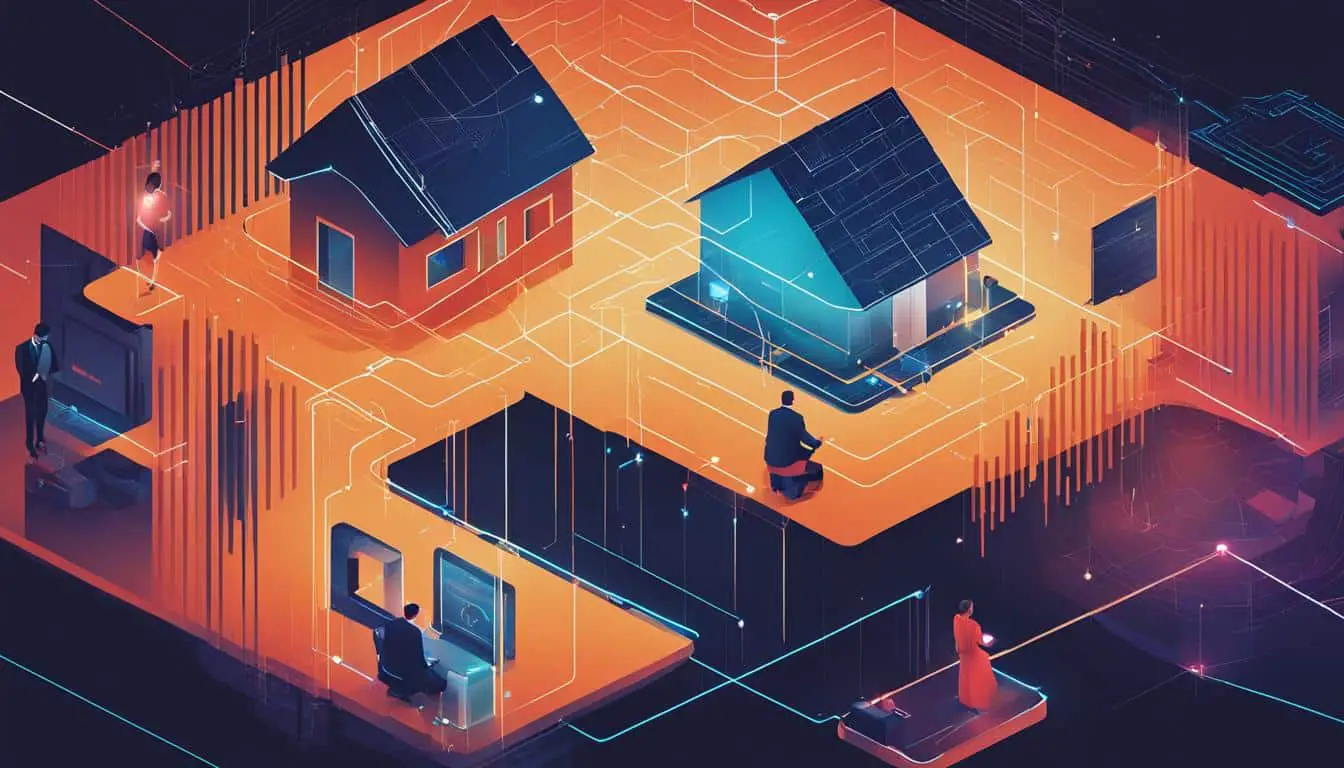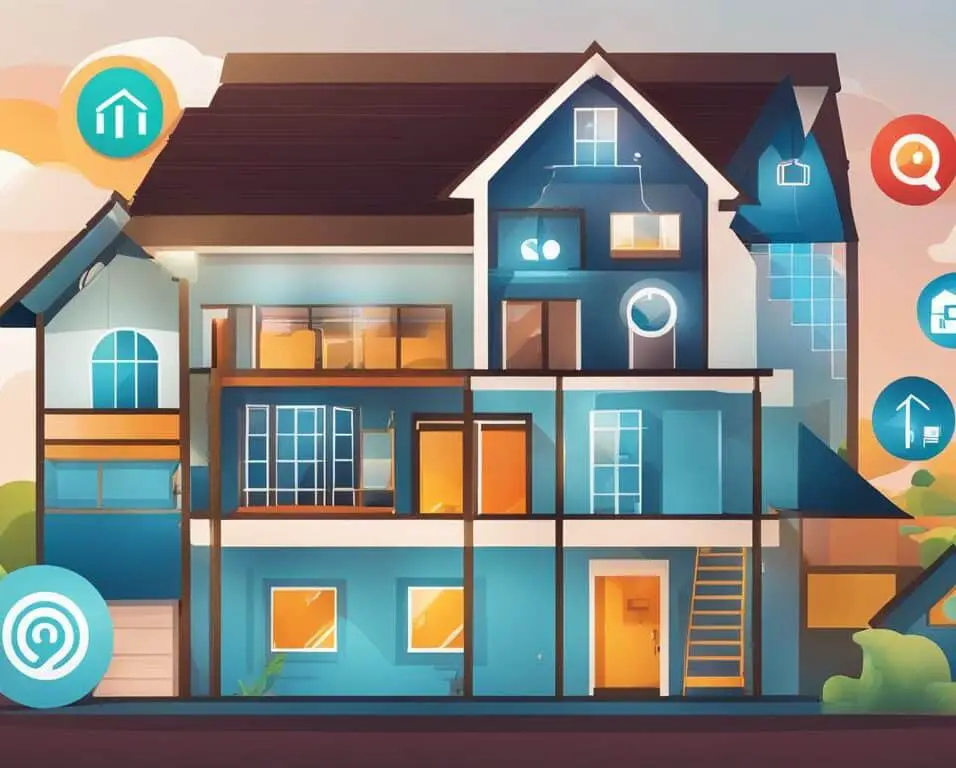The Role of AI in Smart Home Technology
Artificial intelligence (AI) is revolutionizing the way we live in our homes by making them more efficient, convenient, and secure. From automations and virtual assistants to machine-learning algorithms, AI technology has the potential to enhance every aspect of smart home technology. With the integration of AI, smart homes can recognize and respond to the needs and preferences of homeowners, optimize energy usage, improve home security, and provide personalized experiences. The advancements in AI-driven smart home devices, such as smart speakers, security systems, and appliances, are transforming the way we interact with our living spaces.
Key Takeaways:
- AI is revolutionizing smart home technology, making homes more efficient, convenient, and secure.
- Smart homes with AI can optimize energy usage, improve home security, and provide personalized experiences.
- AI-driven smart home devices are transforming the way we interact with our living spaces.
- Artificial intelligence enhances automations, virtual assistants, and machine-learning algorithms in smart homes.
- The integration of AI in smart home technology is shaping the future of homes, making them smarter and more efficient.
AI in Smart Home Automation
AI plays a crucial role in the automation of smart homes, enabling the seamless integration of devices and advanced technologies. Through a central hub, homeowners can automate and remotely manage various tasks, making their lives more convenient and efficient. With AI, smart homes can adapt to the needs and preferences of users, creating personalized and responsive living spaces.
One of the key benefits of AI in smart home automation is the ability to adjust room temperature with precision. AI-powered thermostats can learn users’ heating and cooling preferences and automatically optimize the temperature based on occupancy and external conditions. This not only improves comfort but also contributes to energy efficiency, reducing energy consumption and utility costs.
Lighting control is another area where AI adds value to smart homes. AI algorithms can analyze patterns of light usage and adjust lighting accordingly, creating the perfect ambiance for every occasion. Whether it’s dimming the lights for movie nights or illuminating the home for security purposes, AI-powered lighting systems offer flexibility, convenience, and energy savings.
AI also plays a crucial role in monitoring security and ensuring the safety of smart homes. With AI-enabled surveillance systems, homes can detect burglaries, trespassing, or suspicious activities and instantly send alerts to homeowners or authorities. AI-driven security systems can learn normal behavioral patterns and identify anomalies, providing an added layer of protection for residents.
AI in smart home automation revolutionizes the way we interact with our living spaces, offering enhanced convenience, comfort, and security.
Furthermore, AI helps optimize energy usage in smart homes. By analyzing data from various sensors and devices, AI algorithms can intelligently manage energy consumption, identifying areas of inefficiency and suggesting improvements. This not only reduces energy waste but also lowers utility bills, contributing to a more sustainable and cost-effective lifestyle.
| AI-Enhanced Automation Tasks | Benefits |
|---|---|
| Adjusting room temperature | – Enhanced comfort – Energy efficiency |
| Lighting control | – Personalized ambiance – Energy savings |
| Monitoring security | – Real-time alerts – Enhanced safety |
| Optimizing energy usage | – Reduced energy waste – Lower utility bills |

In conclusion, AI is revolutionizing smart home automation by enabling the seamless integration of devices and advanced technologies. From adjusting room temperature and controlling lighting to monitoring security and optimizing energy usage, AI-powered automation systems offer homeowners enhanced convenience, comfort, and efficiency. With the continued advancement of AI technology, smart homes will become even smarter, transforming the way we live and interact with our living spaces.
AI Applications in Smart Homes
AI technology in smart homes has a wide range of applications that enhance the overall home experience. With AI, smart homes can provide personalized experiences, adapting to users’ needs and preferences. AI-powered devices and systems also contribute to energy efficiency, optimizing the usage of resources and reducing energy consumption. In terms of security and safety, AI enables advanced surveillance systems, automated alerts, and safety devices that help homeowners protect their homes. Smart appliances with AI capabilities offer greater control, flexibility, and convenience, making daily tasks effortless. Additionally, AI technology can integrate personal health monitoring into smart homes, promoting wellness and providing valuable insights into individuals’ health.
Personalized Experience
In the realm of smart homes, AI technology plays a pivotal role in creating personalized experiences for homeowners. Through machine learning algorithms, smart homes can learn and adapt to users’ preferences and behaviors, making adjustments to lighting, temperature, and entertainment options. Whether it’s adjusting the lighting to create the perfect ambiance for a movie night or playing personalized music playlists, AI-driven smart homes have the ability to cater to individual needs, enhancing comfort and convenience.
Energy Efficiency
AI-driven smart homes are also highly energy-efficient, utilizing advanced algorithms to optimize the usage of resources. By monitoring patterns of energy consumption and analyzing data, AI systems can make intelligent decisions to minimize energy waste and reduce costs. For example, AI can automatically adjust heating and cooling systems based on occupancy and weather conditions, ensuring optimal comfort while minimizing energy usage. Furthermore, AI algorithms can detect patterns of energy waste and provide suggestions for improvements, helping homeowners make more sustainable choices.
Security and Safety
When it comes to security and safety, AI technology provides smart homes with comprehensive solutions. AI-powered surveillance systems can detect and identify potential threats, sending automated alerts to homeowners’ smartphones. Additionally, AI algorithms can analyze data from various sensors and devices to identify patterns of suspicious activities and take appropriate actions, such as locking doors or activating alarms. Furthermore, smart homes equipped with AI-controlled safety devices, such as smoke detectors and water leak sensors, can proactively prevent accidents and minimize damages.
Smart Appliances
The integration of AI in smart appliances revolutionizes the way we interact with everyday household devices. AI-powered refrigerators can create shopping lists, track expiration dates, and even suggest recipes based on available ingredients. AI-enabled washing machines can optimize water usage and select the most suitable washing cycle based on fabric types. Additionally, voice-controlled virtual assistants, such as Amazon’s Alexa and Google Assistant, provide seamless integration with smart appliances, allowing users to control and monitor devices with simple voice commands.
| AI Applications in Smart Homes | Benefits |
|---|---|
| Personalized Experience | Enhanced comfort and convenience |
| Energy Efficiency | Reduced energy waste and cost savings |
| Security and Safety | Advanced surveillance and proactive protection |
| Smart Appliances | Greater control and convenience in daily tasks |
| Personal Health | Monitoring wellness and providing insights |
Personal Health
AI technology can also integrate personal health monitoring into smart homes, promoting wellness and providing valuable insights into individuals’ health. Smart devices with built-in sensors, such as fitness trackers and sleep monitors, can collect data on physical activity, sleep patterns, and vital signs. AI algorithms can analyze this data to provide personalized recommendations for exercise routines, sleep schedules, and stress management strategies. By leveraging AI technology, smart homes can contribute to better overall health and well-being.

Conclusion
The integration of AI in smart home automation represents a significant advancement in home technology, improving the quality of life for homeowners. With AI capabilities at the forefront, smart homes have become more innovative, energy-efficient, safe, and convenient, bringing us a step closer to the homes of the future.
By leveraging AI in smart home automation, homeowners can experience greater control over their living spaces. AI-powered devices offer personalized experiences, adapting to individual needs and preferences, enhancing convenience like never before.
With continuous advancements in AI-driven technology, the future of smart homes holds even greater possibilities. As AI continues to evolve, smart homes will become more sophisticated and responsive, further enhancing the way we live, work, and interact within our spaces.
The role of AI in smart home technology is paramount, continually shaping the homes of the future, making them smarter, more efficient, and ultimately improving the quality of life for homeowners.
FAQ
What is the role of AI in smart home technology?
AI revolutionizes smart home technology by enhancing efficiency, convenience, and security. It integrates devices and advanced technologies, automates tasks, adapts to users’ preferences, and provides personalized experiences.
How does AI contribute to smart home automation?
AI enables the integration of devices and systems to improve convenience, comfort, efficiency, and security. It allows homeowners to automate and remotely manage tasks like adjusting room temperature, controlling lighting, monitoring security, and optimizing energy usage.
What are the applications of AI in smart homes?
AI in smart homes offers personalized experiences, optimizes energy efficiency, enhances security and safety, provides smart appliances with greater control and convenience, and integrates personal health monitoring.
What are the benefits of AI in smart home technology?
AI improves the quality of life for homeowners by making their homes more innovative, energy-efficient, safe, and convenient. It provides personalized experiences, enhances convenience, and shapes the homes of the future.








